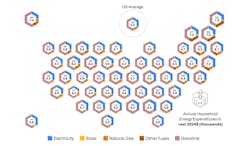EPRI Report Reveals Trends in Household Energy Expenses
An EPRI report has investigated the Energy Wallet, a metric capturing direct household expenditures on energy.
Expenditures reflected in a household's Energy Wallet include electricity, gas and other heating fuels, amortized residential solar systems, retail gasoline purchases, and public electric vehicle charging.
In 2024, the U.S. average Energy Wallet was $5,530 per household, with gasoline having the largest share at $2,930 and electricity accounting for $1,850. Adjusted for economy-wide inflation, the average U.S. energy wallet has been stationary since 2000.
In all states, while energy costs differ across households and regions, average electricity bills represented less than half of the total Energy Wallet. The highest Energy Wallet costs were in New England, where cold climates drive demand for space heating, combined with higher shares of heating with fuel oil and propane, while the lowest costs were in Utah, with a mild climate and relatively low energy prices.
Future technological and structural changes, particularly electrification of light-duty vehicles, have the potential to reduce real average household energy expenses 36-42% by 2050, including scenarios with and without Inflation Reduction Act incentives. State-level average Energy Wallet projected declines range from 10-50% by 2050, based on differences in climate, fuel prices, and other structural factors.
While growing electrification is anticipated to increase electricity expenditures, EPRI modeling suggested that the increase will be more than offset by reductions in gasoline and other fuel costs.
Future EPRI analysis plans to utilize EPRI's modeling tools to study electrification trade-offs and more granular affordability metrics at the household level.
"Even with higher energy prices over time, electrification and the efficiency gains from a broader adoption of emerging technologies can reduce households' energy bills," said EPRI Vice President of Electrification and Sustainable Energy Strategy David Porter. "This report offers stakeholders a more complete lens on household energy affordability, helping them better understand and evaluate opportunities for improvements going forward."
